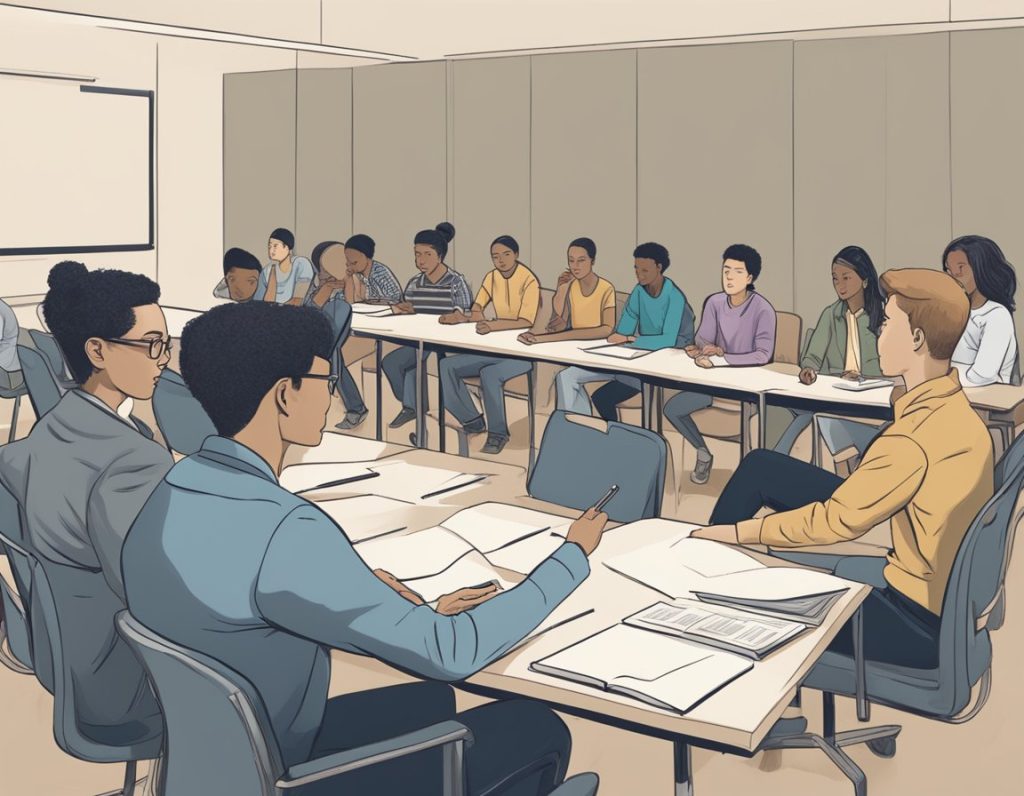Group discussions are a staple in educational settings, but not all students are eager to participate in them. Some feel a sense of dread at the prospect of collaborating with others under academic pressure. Concerns range from fear of public speaking to frustration with unequal contribution levels. While group discussions aim to foster active learning and enhance communication skills, they often encounter resistance.
Understanding why you might dislike group discussions can lead to more effective participation and improved learning outcomes. Whether it’s the anxiety of speaking in front of peers or the struggle to synchronize schedules and work ethics, acknowledging these challenges is the first step toward maximizing the effectiveness of group work.
Key Takeaways
- Group discussions can be stressful for students.
- Challenges include anxiety and unequal participation.
- Recognizing issues can lead to more effective discussions.
Contents
Why Some Students Dislike Group Projects
Several factors contribute to your dislike for group projects. You may experience frustration when faced with:
- Uneven Workload: Often, you may end up doing more than your fair share, while others contribute less, which seems unfair and burdensome.
- Scheduling Conflicts: Aligning your schedule with team members’ can be challenging, leading to stress and delays.
Concerns you may hold include:
- Accountability Issues: If team members underperform, it can affect your grade, causing anxiety over the uncontrollable aspects of the project.
- Skill Disparity: Varying levels of commitment and competence among team members can result in uneven quality of work.
Further reasons for your resistance might involve:
- Communication Breakdowns: You might encounter difficulties in getting in touch with others, leading to misunderstandings and a lack of cohesion in the group effort.
- Preference for Individual Work: You might feel that your learning style is better suited to solo projects, which allows for more control and personal pacing.
5 Challenges of Group Discussions
Group discussions are integral for active learning but can pose significant challenges stemming from student interaction to structural factors.
Varied Student Personalities
You may notice that introverts and extroverts contribute differently in groups. Extroverts might dominate conversations, while introverts may struggle with active participation, which affects the overall dynamics and can lead to dissatisfaction among group members.
Group Dynamics and Accountability
Group tasks demand a high level of trust and accountability, which can be problematic. It’s essential to ensure individual responsibility is clear to maintain healthy group dynamics and prevent peer pressure from negatively impacting motivation.
Motivation and Participation
Motivation varies widely in group projects. Some members may not feel the tasks are beneficial, leading to uneven student participation. This lack of engagement can reduce the effectiveness of collaborative learning experiences.
Structural and Institutional Factors
In a large lecture or a class with a rigid structure, facilitating collaborative learning can be a challenge. Teaching strategies need to adapt to allow space for communication and trust-building within groups.
Peer Assessment and Self-Reflection
Peer-assessment and self-reflection are crucial components for individual accountability. However, students may struggle with these aspects due to discomfort with evaluating peers or a lack of communication skills necessary for constructive feedback.
Maximizing Effectiveness in Group Discussions
In group discussions, your success hinges on structured strategies, clear communication, and a supportive learning climate. These elements combat common issues like social loafing and group dysfunction.
Incorporating Effective Teaching Strategies
Employ active learning techniques such as team-based learning and POGIL (Process Oriented Guided Inquiry Learning) to keep group discussions lively. Use structured material that challenges you to engage deeply and think critically.
Enhancing Communication and Problem-Solving
It is essential to foster strong communication and problem-solving skills within your group. This means openly exchanging ideas, effective negotiation, and addressing any conflict promptly to maintain a productive atmosphere.
Fostering a Cooperative Learning Environment
Collaborative learning and cooperative learning frameworks create a sense of community. By promoting peer-to-peer interaction, you can leverage collective knowledge to excel and reduce the occurrence of free-riding.
Evaluation and Feedback
Regular performance feedback helps you understand your strengths and areas for growth. Such evaluation encourages continual improvement and holds all members accountable, minimizing instances of social loafing.
Frequently Asked Questions
In this section, you’ll find answers to common questions about the challenges faced during group discussions and projects.
What are the common reasons for unequal participation in group work?
Unequal participation in group work often stems from diverse skill levels, varying degrees of interest in the subject, and differing availability and commitment among group members. It can lead to an imbalance where certain students take on more work than others.
How can group projects contribute to a negative experience for students?
Group projects can lead to frustrations when there’s a lack of coordination, poor communication, or when some members do not contribute equally, causing resentment among the more active students who feel their efforts are not matched.
From a student’s perspective, what insights explain the aversion to group work?
Students may dislike group work due to experiences with free-riders, fear of their academic success being tied to others’ efforts, or simply preferring to learn and work at their own pace without the need to reconcile differing viewpoints and work habits.
What factors can lead to increased stress levels during a group project?
Stress levels can spike due to looming deadlines, disagreements on project direction, work distribution concerns, and the pressure of being graded as a group rather than as an individual, leading to anxiety about collective performance.
Final Words
You’ve seen why group discussions can be a challenge: varying participation levels, concern over grades, and negative past experiences. Embrace strategies such as assigning roles to foster engagement. Remember, effective collaboration is a skill that improves with practice and the right approaches. Your success in group endeavors hinges on contribution and open communication.

